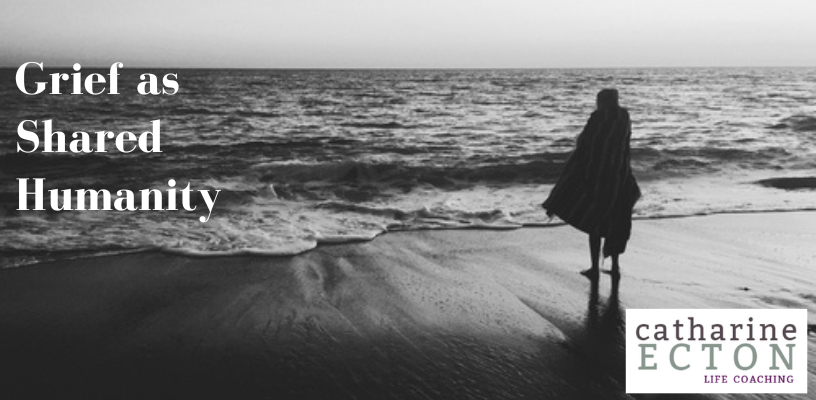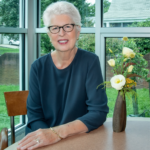
As I navigate this overwhelming grief, I’ve come to realize that grief, in all its forms, is not just an inevitable part of the human experience—it’s something that unites us all. It connects us to others who have walked this path before us and those who will walk it after us. We are not alone in our sorrow; we are part of a shared humanity that understands, feels, and endures.
Clients Handling Grief: Stories of Shared Humanity
Let me share the stories of a few clients (names changed for privacy), each navigating their own transitions and the grief that accompanies them:
Patty:
Patty is grappling with the unbearable sorrow of losing her young child. The pain is overwhelming. She feels an intense desire to change everything—move to a new place, start a new job, and find new friends. But the big changes she wants don’t sit well with her family. Instead, she’s finding ways to reorganize her life, setting specific, achievable goals. She’s discovering that personal change can coexist with honoring her son’s memory and that grief, while isolating, also connects her deeply to those who’ve experienced similar losses. In her sorrow, she’s finding solace in the understanding that others share in her pain, and this shared humanity offers a sense of comfort.
Dan:
Dan is planning to retire in a few years after more than three decades in a demanding job. He knows he will mourn the loss of his work, colleagues, and the routine that has defined him. But he’s committed to this next chapter. Dan is learning that retirement means letting go of the identity that once made him feel confident and successful. He is working on embracing a new attitude, one that will allow him to step into a fulfilling future. His grief over the life he’s leaving behind is tempered by the understanding that change, though difficult, is a shared human experience. The grief he feels is like a blanket that, while heavy, is also warm with the knowledge that he is not alone.
Mary:
Mary’s inner voice is urging her to step away from the rat race. Her job has consumed years of her time taking away the energy to live true to her values of family, nature, and the joy of simply living. But her identity is wrapped up in her work and she fears losing herself if she leaves. In coaching, she is exploring career options and setting goals to fulfill her priorities. Mary recognizes that an external change is necessary to create the space for her internal growth. As she contemplates this transition, Mary is mourning her move away from the life she’s known but finds comfort in the knowledge that such grief is a universal part of growing and going forward.
Cynthia:
After 25 years of living and working in another state, Cynthia has returned to her hometown to support her aging mother and reconnect with her siblings. But now what? As she transitions from one chapter to the next, Cynthia is confronting the reality and the uncertainties that come with it. Her grief over the life she’s left behind is interwoven with the anticipation of what lies ahead. In her journey, she is reminded that this moment is not just about loss, but also about the connections that bind us to one another as we move through life’s inevitable changes.
Each of these stories, like my own, illustrates the arc of life. Loss is part of life’s transitions. I am now a widow. It’s a group I assumed I would be part of one day, and yet it doesn’t feel “normal” to me. I don’t like it!
A Cultural Shift
The cultural shift we need right now is learning how to engage with both our collective and individual grief. It’s unmistakeable that we are all living through a profound time in history, one that has brought unprecedented changes. I believe one of the most important ways forward is to cultivate a culture where grief is normalized, and creating safe spaces to share and discuss our grief can help support that. That’s why I do this work.
Our cultural perspective on grief needs to change. Culturally and individually, we must give ourselves permission to grieve.
This begins with each of us. Finding safe spaces, communities, and support systems in our own lives where we can explore our grief, lean into the pain, and find ways of expressing grief in a healthy way is essential.
Grief may be one of the most difficult aspects of the human experience, but it also offers us an opportunity to grow, to connect, and to find meaning in the midst of loss.
Here to Support You
 As a Washington, D.C.-based life coach specializing in grief and loss, I am interested in listening to your story. I too have navigated loss, and have come to understand grief as a normal part of the human experience. Sometimes, losses are ignored, swept under the rug, not discussed, or go unrecognized. Our culture encourages us to move on, be productive, and get over it. But processing loss and sitting with the feelings is just as important, if not more so.
As a Washington, D.C.-based life coach specializing in grief and loss, I am interested in listening to your story. I too have navigated loss, and have come to understand grief as a normal part of the human experience. Sometimes, losses are ignored, swept under the rug, not discussed, or go unrecognized. Our culture encourages us to move on, be productive, and get over it. But processing loss and sitting with the feelings is just as important, if not more so.
Reaching out for help and summoning the resources available to you is the first step towards doing just that.
Over the years, clients have come to me with losses that include:
- Physical loss of someone they love due to death, a geographic move, or changing jobs
- Loss of a child in an accident
- Loss of contact with a friend or family member
- The death of a pet
- The loss of a job
- Loss of control over some aspect of their lives
- Chronic illness, or chronic illness of someone they love
- Loss of confidence, security, goals, or a life plan
- Personal physical losses due to illness or the natural aging process
- Climate-related grief
- Grief related to racial injustice
Click Here to Schedule a Complimentary Coaching Call With Me at a time convenient for you if you are in the midst of a transition and recognize the need for support, compassion, and being heard.
Outcomes of grief and loss coaching *may* include:
- Learning to work with your grief instead of against it
- Building a relationship, setting goals, making changes, building on what works for you
- Increased freedom and a better sense of personal identity
- Access to a non-judgemental space and powerful questions that allow you to find your own answers
Are you interested in working with me as your coach? Use my Appointment Scheduler and pick a time that works for you for a complimentary, no-obligations life coaching phone consultation. Although many look for a “grief coach near me,” I’ve found it makes the best use of everyone’s time to schedule appointments online and conduct them over the phone. This means I am a grief coach based in Washington, DC, and serving the world. I look forward to hearing from you.

Comments are closed, but trackbacks and pingbacks are open.